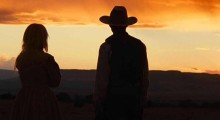Directing
Filmmaking - Directing
-
Jared Moshe on Dead Man’s Burden

Sumptuous and evocative, Jared Moshe’s Dead Man’s Burden is the rarest of species in specialty film, a Western. More importantly, it is a fine addition to the genre, a complex meditation on the wages of sin and the burdens of family, a chamber drama with more than a hint of noir. Set during the years after the Civil War in and around a rural New Mexican ranch, the film initially focuses on a young couple, Martha (Clare Bowen) and Heck (David Call). They plan to sell the ranch after the death of her father, a struggling farmer, and use the money […]
-
Five Questions for Unmade in China Directors Gil Kofman and Tanner King Barklow

Screenwriter George Richards wrote Case Sensitive as “an American thriller with American actors for an American audience.” Director Gil Kofman (The Memory Thief) brought the script to producer Seth Scher, who had connections to a Chinese investor who was making films for the Chinese market. The film was greenlit and Kofman, who does not speak Chinese, traveled to Xiamen, China, to direct his second narrative feature. Soon afterward his friend, documentary filmmaker Tanner King Barklow, joined him and began documenting Kofman’s travails as he tried to navigate a colossal language barrier, bureaucracy, corruption, and cultural differences. Early in the documentary […]
-
Letters from Blocked Filmmakers: Drew Whitmire

Independent films get made, often miraculously, and we cover those films here at Filmmaker. But what about all those other projects that never, despite the best of intentions, make it through production, much less hit theaters? In this new series, “Letters from Blocked Filmmakers,” we’ll be hearing from directors who have struggled for years to realize their films only to come up short. Is the system to blame? Bad luck? Themselves? I’ll let the filmmakers answer these questions in their own words. I’m happy to be opening this series with this letter from Drew Whitmire, who has been attempting to […]
-
Terence Nance on An Oversimplification of Her Beauty

An Oversimplification of Her Beauty is such a fine, rare bird: Terence Nance’s Gotham Award-winning debut film is, regardless of its aesthetic pyrotechnics and self-reflexivity (it consists of a series of short experimental films that radically deconstruct Nance’s romantic foibles), wholly, fully, truly accessible to everyone. If Hollis Frampton and Nina Paley had somehow, through the force of magic realism, had a black love child, it would have grown up to direct something like this. It’s altogether unusual strategy for detailing Nance’s obsessive courtship of a young woman named Namik Minter — using reenactments, direct address, doc interviews, stop-motion and traditional animation to […]
-
Graham Meriwether on American Meat

Even in the heart of the Midwest, where driving past rural pastures dotted with cows is not uncommon, I rarely thought of where my food came from. How often as a child or young adult, chomping on a spicy chicken sandwich from Wendy’s or slurping up Cincinnati-style chili at my mother’s dining room table, was I confronted intellectually with the fragility and inhumanity of our modern food production system, especially when it comes to the most popular proteins in the American diet, beef and chicken? I doubt a meal went by that wouldn’t cause my older self anxiety. It’s almost shameful […]
-
Meet the Latest SFFS/KRF Filmmaking Grant Finalists (Part 3)

Last year on the Filmmaker website, we ran a series of pieces in which we profiled a group of finalists for the San Francisco Film Society’s Kenneth Rainin Foundation Filmmaking grant, run through the organization’s Filmmaker360 program. Now there’s a new set of finalists, and we are once again putting the spotlight on all those shortlisted for the grant. You can read Part 1 of this current series here and Part 2 of the series here. JONAS CARPIGNANO (WRITER/DIRECTOR), A CHJÀNA Synopsis: After leaving his native Burkina Faso, Ayiva makes the perilous journey across the Sahara and Mediterranean in search of a better life in Europe. Once in Italy, he […]
-
Antonio Campos and the Case of the Conscious Camera (A Mystery)

In a moment where American independent cinema seems to be primarily focused with character and regional setting, Antonio Campos stands in stark contrast with his peers. Concerned with intricate problems posed by framing, camera movement and editing, Campos used a formal investigation into the medium to guide him through his debut feature, Afterschool, which is a kind of materialist examination of how reality is affected by the digital representation thereof. With his latest film, Simon Killer, Campos is less concerned with a topical milieu than he is with the mental state of the troubled eponymous individual; in the process of […]
-
10 Lessons on Filmmaking from Director Ken Loach

Few filmmakers bring to life social issues as vividly as Ken Loach. Whether helming grand historical dramas about family, love and civil war (The Wind That Shakes the Barley, Land and Freedom) or character-driven films detailing the plight of the working class (Kes, Riff-Raff, Sweet Sixteen, Bread and Roses) Loach is a master of creating universal stories that are immensely relatable regardless of time or place. His latest effort, a documentary, The Spirit of ’45, which had its world premiere at this year’s Berlinale, continues the grand tradition with a story as relevant today as it was over half a […]
-
Ginger & Rosa Director Sally Potter on Taking Chances

Sally Potter spoke to a sold-out, mostly female audience on a springlike afternoon in Toronto. She was the latest world-renowned director to sit in the interview at the TIFF Bell Lightbox, and she discussed with journalist Johanna Schneller her experiences and views on filmmaking while clips of her films burst on the screen including her latest, Ginger & Rosa. The session started with a moment from her little-seen 1979 short, Thriller. It’s an experimental short consisting of grainy black-and-white photos married to the opera La Boheme and Bernard Hermann’s theme from Psycho. “The decisions I made were about trying to bring […]
-
Su Friedrich on Gut Renovation

“Gentrification is the opposite of the apocalypse. The apocalypse would pause history, level the built world to a pile of trash, and most likely lower rents considerably. Gentrification churns history forward, takes out the trash, carts away rubble, hides the poor, makes you work more and more to manage your rent, and encrypts the past, when you didn’t have to work so many jobs just to fucking live here, behind its glossy surfaces.” – Kristin Dombek, “How to Quit”, n+1 issue 15 Colson Whitehead, in an essay about how his adopted neighborhood of Fort Greene was changing and would continue […]










